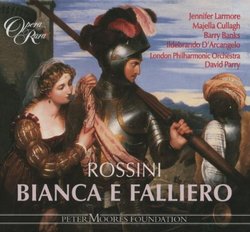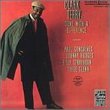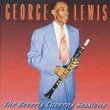| All Artists: Gioachino Rossini, David Parry, Jennifer Larmore, Majella Cullagh, London Philharmonic Orchestra, Geoffrey Mitchell Choir, Ildebrando D'Arcangelo, Barry Banks, Gabriella Colecchia, Simon Bailey, Ryland Davis Dominic Natoli Title: Rossini - Bianca e Falliero / Larmore · Cullagh · Banks · D'Arcangelo · LPO · Parry (Complete Opera) Members Wishing: 1 Total Copies: 0 Label: Opera Rara UK Release Date: 12/11/2001 Album Type: Import Genre: Classical Style: Opera & Classical Vocal Number of Discs: 3 SwapaCD Credits: 3 UPC: 792938002026 |
Search - Gioachino Rossini, David Parry, Jennifer Larmore :: Rossini - Bianca e Falliero / Larmore · Cullagh · Banks · D'Arcangelo · LPO · Parry (Complete Opera)
 | Gioachino Rossini, David Parry, Jennifer Larmore Rossini - Bianca e Falliero / Larmore · Cullagh · Banks · D'Arcangelo · LPO · Parry (Complete Opera) Genre: Classical Bianca e Falliero has enough fine music to get the blood boiling, the toes tapping, and the hands clapping. It is strong in rhythmically exciting pieces and showy, virtuosic singing, both of which are in ample supply in th... more » |
Larger Image |
CD DetailsSynopsis
Amazon.com Bianca e Falliero has enough fine music to get the blood boiling, the toes tapping, and the hands clapping. It is strong in rhythmically exciting pieces and showy, virtuosic singing, both of which are in ample supply in this performance. Jennifer Larmore gets through Falliero's music with incredible aplomb and a truly handsome tone. Majella Cullagh's Bianca is just as technically fine as Larmore's Falliero, and she, too, pays close attention to expressing her predicament. Contareno, Bianca's cruel father, is sung by the exciting, accomplished tenor Barry Banks, who seems to understand that Rossini occasionally uses high notes and difficult roulades as expressive weapons. The others in the cast don't let us down. David Parry conducts with an inner tension that keeps the listener riveted. --Robert Levine Similar CDs
|
CD ReviewsEating Crow dwadefoley | New York, New York United States | 01/05/2002 (4 out of 5 stars) "I railed when I first discovered that Opera Rara planned to release "Bianca e Falliero". I saw it as part of a seeming trend of recording operas that were already familiar, and for which good recordings were already commercially available (Maria de Rudenz and Rossini's Otello being the other examples that come to mind). After all, the Pesaro revival of Falliero in 1986, which featured a dream cast of Horne, Ricciarelli, and Merritt, could hardly be surpassed. I predicted that Opera Rara's new recording would be superfluous. Crow is not a tasty dish, and I was forced to eat a generous helping when I heard this new recording. The opera itself is gorgeous, and the performance, while not perfect, is a delight to listen to. Horne and Ricciarelli had both left their best years behind when they performed the opera, so the recording of that event, while immensely enjoyable, is by no means the be-all and end-all. Opera Rara's new version manages to say something different about this intriguing work.
Jennifer Larmore was in excellent form for this recording. In fact, this is probably the most impressive performance I've heard her give on disc. Her runs, trills, roulades, and octave-plus leaps are handled fearlessly and with such assurance that it almost sounds easy. She exhibits ringing top notes, a deep, resonant voce di petto, and the dramatic ability to make the rather cardboard figure of Falliero come alive in three dimensions, even in potentially dull passages of secco recitative. Her long solo scene in the second act is a tremendous accomplishment, calling for a whole range of emotional histrionics and vocal fireworks. Larmore faces this exhausting scene with complete confidence, and the result is sublime. Consisting of four separate arias and two passages of recitative, preceded by a chorus, it is a foretaste of days to come, when scenes depicting protagonists facing execution would figure prominently in operas like Anna Bolena, Maria Stuarda, and Beatrice di Tenda. Here, the result is no less moving, thanks to Larmore's superb interpretation, which runs a gamut of emotions from melancholy to despair and vengeful anger. As if this weren't enough, Larmore's two duets with Majella Cullagh (Bianca), are beautiful enough to soften stone, and her Act I aria is no less praiseworthy than the longer solo in Act II. I thought Majella Cullagh wonderful in the Opera Rara Zoraida di Granata, where her light soprano was perfectly suited to the role. Here I would have preferred a meatier dramatic coloratura soprano for the role of Bianca. To be sure, Cullagh has a great command of coloratura technique, and her voice is pure in tone and hardly unpleasant to hear. Her aria in Act I and the final rondo (a transplant from La Donna del Lago that will be familiar to most) are handled with technical virtuosity, but Cullagh's voice is too small to really make the most of these numbers. Barry Banks has no fear of the technical demands of the tenor role of Contareno, Bianca's selfish father. Banks makes the most of the dramatic opportunities afforded him by the composer, and storms angrily through the role. He's at his best in his duet with Cullagh. It's a commendable performance on both vocal and dramatic fronts. This said, Banks's voice has a strangely arid quality, and I'm reserving judgment on whether I like it or not; I have a feeling it's an acquired taste. As Bianca's unwanted suitor Cappellio, bass Ildebrando d'Arcangelo is impressive, but he does not get much chance to show off his mellifluous voice: Rossini did not give Cappellio any arias to sing. However, his tuneful duet with Contareno in the introductory scene of the opera is a treat. Opera Rara sets such a high standard of presentation for their recordings that the slightest deviation is likely to disappoint. Here, their choice of Charles Osborne to write the liner notes seems strange. Osborne's essay does not have the detail and depth of Jeremy Commons' notes from previous Opera Rara booklets, and his comments about the opera are mostly negative in tone, with praise given grudgingly. A significant number of passages in the essay are lifted directly from his earlier reference work "The Bel Canto Operas" almost verbatim, though there is more detail here and his estimation of the opera's value has improved slightly. One wonders if his lack of enthusiasm for the piece influenced how much time he spent on writing the notes. Nevertheless, the booklet is a lot better than you'll get from any other label, and the essay, to be fair to Osborne, is well-written and will prove informative to those previously unfamiliar to the opera. Tom Kaufman gives a complete history of the opera's 19th century performances. It's interesting that both Adelaide Tosi and Giuditta Grisi sang both Bianca AND Falliero. As has become customary, wonderful color photography of the singers enjoying themselves in recording sessions, along with reproductions of 19th century drawings of interpreters of the major roles in the opera, make the booklet visually appealing as well as educational. I might also add that the box cover and booklet cover show some of the most sumptuous art reproductions you'll find in any CD case. If you're still in doubt, you can't lose much by buying the recording, as it is the most reasonably priced set Opera Rara has so far offered. In short, this recording is not redundant, and deserves to be placed on your shelf alongside the Horne-Ricciarelli recording." |



